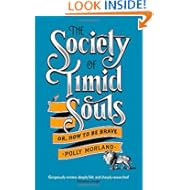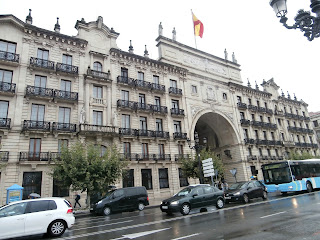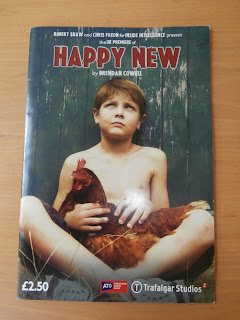
I love going to authors' talks and writing workshops. But much as I like to blog about them, it's sometimes hard to catch up. September and early October seem to be the worst months.
On the 16th I enjoyed 'Found in Translation' at the LSE, in the splendid Khalili Theatre. Novelists Ali Smith, Julian Barnes and Adam Thirwell, plus Sandra Smith ( translator of
Suite Française) discussed the art and importance of translation, and the perils of Anglocentricity to a packed house. It was arranged by
The Royal Society and produced exactly the right mix of personalities to be entertaining.
I somewhat naively began to learn foreign languages because I thought I'd learn to read foreign books in their original form. The best I achieve as a rule is to prepare for classes with the help of a parallel text, or a translation. I once read 'Madame Bovary' in French on a long holiday away from foreign bookstores, (it helped that I'd already ready that in English) but reading Marquez's '100 Years of Solitude' at a rate of six pages a week in a Spanish class, although interesting, is more torture than pleasure. Although there's something to be said for such a slow approach to a very rich and complex text.
I didn't have to go far to get to the LSE, and indeed I don't have to leave London to get my fill of talks and workshops. But I also like to travel beyond the M25.
On the 19th I attended two events at the Woodstock Literary Festival. I didn't have time to visit Blenheim Palace, which can be accessed from the village , but I did take a lunch-time coffee at the Oxfordshire museum in the main street.
It's a modern building and has an art gallery as well as a garden. I ate my sandwich on a bench alongside the old town stocks, opposite the church where I heard Ruth Rendell talk about
her latest book and answer questions about her life as a crime writer. In the same café I overheard someone say she could be 'tetchy', but when I asked her to pose for a photo she agreed at once, and suggested we move to a lighter bit of the church when the first attempt came out blurred. Now I'm a bigger fan than ever.
In the afternoon I went to another church to hear an intriguingly title talk called 'How to be Female and Awesome in the Modern Age.' Journalist and broadcaster Melissa Benn, popular Guardian writer and columnist Hadley Freeman, and documentary-maker turned writer Polly Morland talked about how women should live their lives in the 21st century, what the constraints are, and whether it is still a man’s world. They came to a generally pessimistic conclusion.
This visit took its toll on the coffers as I bought all three of the books on offer.
Benn’s
What Should We Tell Our Daughters? The Pleasures and Pressures of Growing up Female confronts the casual sexism that still meets young women growing up today, from the avalanche of unrealistically skinny models who depend on their looks for success, to inequality at home, at the office and in pay. Benn’s journalism appears in many national newspapers and magazines, and she has written and presented several Radio Four programmes.

Freeman’s latest book,
Be Awesome: Modern Life for Modern Ladies, tackles subjects vital to any modern woman. Discussion ranges from ‘How to read women’s magazines without wanting to grow a penis’ to topics such as ‘Beyond the armpit: a guide to being a modern day feminist’. Freeman writes the
Guardian’s Ask Hadley fashion column and contributes to
US Vogue.

Morland''s first book,
The Society of Timid Souls: Or, How to be Brave, has been longlisted for the 2013 Guardian First Book Award. She looks at what courage means for women today.
At least I didn't buy any books at the short story masterclass I attended on Thursday 3rd October, part of the Havant Literary Festival. I was curious to revisit an old haunt. Fifty years ago, when my husband was a student in Portsmouth, one of the jobs I did was in a factory in Havant. I learned to solder components onto circuit boards round a big table with some very lewd women, a short-lived experience because I was useless at it - soldering, not lewdness. I was only eighteen.
The Plessey factory has closed long ago, or so I was informed in the friendly group of a dozen or so writers assembled in the card room of the Conservative club on the Emsworth Road. It didn't strike me at the time, but in the tea-break I found out that Emsworth has connections with
PG Wodehouse. In fact, a member of the group who lives there said she wants to organise an Emsworth festival next year.
Although living in London means I'm spoilt for choice when it comes to writing groups, I envied these writers a sense of cohesion, and the way in which they mentioned local writing circles and locations with the confidence that their hearers would know them. Exotic local names such as Liphook and Waterlooville stirred my own memories.
Havant is no more picturesque than I remember, especially in the rain, with a windswept and almost deserted shopping centre. When I called in at the Spring Heritage Centre to take my bearings and zip up my jacket, though, I wished I'd had more time to enjoy the exhibits. I did get time to look at a mock-up of a 1950s kitchen and a machine for cutting out leather gloves.
The venue for class was the card room of a local Conservative Club, which resembled, appropriately enough, a colonial residence.
The camaraderie made it go well. After introductions we were given and discussed information about short story markets and requirements. Tutor
Carol Westron, a published short story writer, was a friend of women's fiction doyenne Della Galton and passed on a list of tips gleaned from Della's work as a competitions judge. Carol herself has worked with groups of disabled writers, so perhaps it's not so surprising that many of the assembly came from similar backgrounds, with an interest in the therapeutic value of creative writing. She's a good teacher - enthusiastic with a sense of fun and a very encouraging manner.
For the active writing part of the three hour session we chose names from different kinds of dictionaries. Having read a lot of Jane Austen recently, I opted for a dictionary of eighteenth century name. After writing detailed descriptions of appearance and preferences of a male and a female character, we chose opening lines from lists and and constructed opening paragraphs which we read aloud.
At the end of it I had the beginnings of a short story in the historical romance genre, with a heroine called Phoebe Foster. Later, on a train that stopped at every station between Havant and Victoria, I secured a whole table for my own use and revised the opening of a story I'm writing on for a competition.
The latest event took place yesterday, and this time not far from home - a talk at King's Place, York Way, by the marvellously flamboyant and entertaining Jung Chang, author of 'Wild Swans' and 'Mao: The Untold Story'. She was talking about Empress Dowager Cixi, the subject of her latest book, which was recently chosen as 'book of the week' and read in instalments on BBC Radio 4.
Two notes to self : a) put into practice in my own writing what I've learned from the speakers, and b) keep up with blog posts so I can give each event the coverage it deserves.




















































